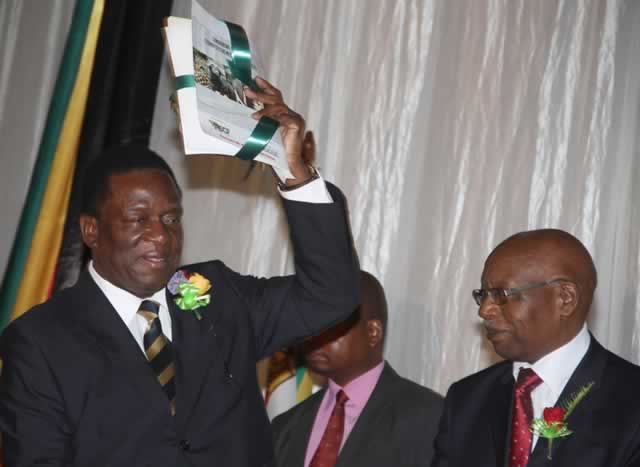Human capital: Zim’s greatest competitive advantage


VP Mnangagwa raises the Zimbabwe National Competitiveness Report after its official launch in Harare yesterday, while ZNCR executive director Mr Norman Chakanetsa (right) looks on
Tinashe Makichi Business Reporter
The high quality of human capital is Zimbabwe’s greatest competitive advantage with literacy rates of above 92 percent compared to other countries, according to the National Competitiveness Report which was launched yesterday by Vice President Emmerson Mnangagwa.
The report also highlighted that economic diversity is another competitive advantage as the country is engaged in various sectors of production and services including agriculture, mining, manufacturing, and tourism, financial services and ICTs, among others.
While giving highlights of the report at the launch yesterday, Deputy Chief Secretary in the Office of the President and Cabinet Retired Colonel Christian Katsande said Zimbabweans are in high demand throughout the region and abroad, a result of the Government’s deliberate policy of focusing on universal education.
He said concerns were, however, raised over the growing mismatch between the skills produced by institutions of learning and the industry requirements.
Vice President Mnangagwa however, said while Zimbabwe boasted of human capital competitiveness; there was need to look at their productivity and contribution to economic development.
“Indeed while it is an irrefutable fact that our human resources are highly skilled, it is now time to look at their productivity. I have observed that most universities and colleges are churning out graduates with administration and management skills in an economy where we need practical skills at the production level.
“We therefore need a paradigm shift by aligning our education curriculum with industrial skills,” he said.
To this end, VP Mnangagwa said, Government will expedite the establishment of the national productivity institute, a key institution that will address labour productivity issues.
“The report recommends the expedition in the establishment of a national productivity institute that will provide consultancy as well conduct research in the area of productivity. Currently Zimbabwe ranks lowly on labour productivity when compared to other countries,” he said.
In terms of the 12 Pillars of Competitiveness, the country lags behind comparator countries in most key indicators. Notably, the country scored poorly in the category of innovation, business sophistication, labour market efficiency, goods market efficiency, infrastructure and institutions.
Zimbabwe is only highly rated in health and primary education and macro-economic environment. The leading factor for the improvement in the macro-economic environment in Zimbabwe has been attributed to the country’s success in combating inflation
The competitiveness report is designed as a critical tool in enabling Zimbabwe’s economic actors to achieve the robust economic goal of seven percent GDP growth enshrined in the Zimbabwe Agenda for Sustainable Socio-Economic Transformation.
VP Mnangagwa said the country should address the prevailing competitiveness challenges in order to start enjoying the benefits of regional integration and globalisation.
He said competitiveness will enable the country to exploit the advantages that come with regional integration. Zimbabwe has active bilateral and multilateral trading agreements that should be fully utilised to optimise competitive advantage. These include the Interim Economic Partnership Agreement with European Union that was ratified in March 2012 which allows for a duty free quota market access to the EU.
“Government, therefore, urges companies to value add our raw material and produce quality products that match international standards. These positive opportunities for trade throughout Africa and beyond also raise the spectre of greater competition from other countries.
Policy Co-ordination and Promotion of Socio-Economic Ventures in the President’s Office Minister Ambassador Simon Khaya Moyo said the launch of the National Competitiveness Report comes at a time when Government has set up a task force to see through the implementation of agreed strategies to improve the ease of doing business in the country.
He said policy co-ordination is key to economic growth. It also entails bringing together various stakeholders with varying interests in terms of formulation and implementation of any Government policy.











Comments